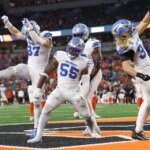Warning: Undefined array key "post_type_share_twitter_account" in /var/www/vhosts/casinonewsblogger.com/public_html/wp-content/themes/cryptocurrency/vslmd/share/share.php on line 24
A Sacramento County Superior Court judge has dismissed a major lawsuit brought by California’s tribal casinos against the state’s cardrooms, marking another turning point in the long-running dispute over casino-style gaming rights. The tribes, who claim exclusive authority to offer games such as blackjack under state law, were granted a one-time opportunity to sue through Senate Bill 549, passed by the Legislature and signed by Gov. Gavin Newsom in 2024. However, Judge Lauri Damrell ruled that federal gambling law overrides the measure, leaving the tribal challenge without a state court venue.
Judge Rules Federal Law Overrides State-Granted Authority
Judge Damrell affirmed in her written decision that “the court is mindful that previous efforts to resolve this longstanding dispute — whether through regulatory action, legislation, ballot initiatives, or litigation — have been unavailing.” She noted the Legislature’s intent to settle the conflict but added she was “bound by the limits of federal law,” as reported by CalMatters. The ruling effectively halts the tribes’ latest attempt to challenge cardrooms’ operations, despite the state law that temporarily authorized such lawsuits.
During the hearing, Damrell also remarked, “I may be wrong, and I expect there will be an appeal,” acknowledging that the issue may soon be revisited by the Court of Appeal. The tribes’ attorney, Adam Lauridsen of Keker, Van Nest & Peters, confirmed an appeal will be filed, ensuring the dispute between tribal casinos and cardrooms continues into its next phase. A follow-up status conference has been scheduled for November 4 to address preservation of case evidence pending appeal.
The tribes filed their lawsuit on January 2, 2025, the first day courts opened after SB 549 took effect. Their complaint accused numerous California cardrooms of running prohibited banked-style games, including blackjack and pai gow poker, in violation of the tribes’ exclusive gaming rights. “Defendants brazenly profit from illegal gambling,” the lawsuit began. Tribal leaders argue that California voters granted tribes sole authority to operate such games through Proposition 1A, and that these operations fund critical programs for their communities.
In contrast, the cardroom industry maintains its operations are legal, citing decades of approval from the state’s attorney general and gambling regulators. For years, cardrooms have used a system of third-party proposition players—licensed entities that act as “bankers” at tables—to comply with state laws forbidding them from wagering against customers directly. “Cardrooms for many decades have proudly operated lawful games with full transparency and stringent oversight,” said California Gaming Association President Kyle Kirkland. “Our member cardrooms will continue to support good jobs, vital public services, and local economies across California while upholding the highest standards of integrity, accountability, and compliance.”
The stakes go beyond the casino floor. Many California cities rely heavily on tax revenue from cardrooms. San Jose City Councilmember Sergio Jimenez told lawmakers last year that his city receives $30 million annually from these establishments—funding roughly 150 police officers or 133 firefighters. A tribal victory, officials warned, could have threatened essential services in municipalities like Commerce and Hawaiian Gardens.
Tribes Vow to Continue the Fight
Tribal representatives expressed disappointment with the ruling, arguing it denies them a fair opportunity to have their case fully heard. “This outcome is especially troubling given that it was a state law enacted just last year that explicitly gave tribes standing in state court,” said James Siva, chairperson of the California Nations Indian Gaming Association. “It’s difficult to reconcile this ruling with the clear intent of the Legislature, and once again, a court has sidestepped the actual merits of the case — effectively denying tribes a fair opportunity to seek justice.”
Attorney Lauridsen reiterated that the decision was procedural and did not address the core question of whether cardroom games violate state law. He stated, “The idea that this law, governing gaming by non-Tribes on non-Tribal land, is preempted by federal regulations governing gaming by Indian tribes on Indian land, is incorrect. The Tribes fundamentally disagree with this conclusion and will argue forcefully on appeal.”
The conflict over SB 549 was one of the most expensive legislative battles of the previous session. Tribes and cardrooms poured millions into lobbying and campaign contributions. The Gardens Casino – Hawaiian Gardens alone spent $9.1 million in 2023—second only to Chevron—while opposing the bill. After Newsom signed the law, the cardroom sector spent more than $3 million campaigning against lawmakers who supported it, resulting in several losing reelection, including bill author Sen. Josh Newman.
Despite this courtroom setback, tribal lobbying has not slowed. In September, lawmakers passed Assembly Bill 831, which bans online gaming companies from offering digital sweepstakes that tribes consider a threat to their exclusive gaming rights. Governor Gavin Newsom signed AB 831 into law on October 12, 2025, confirming its enactment. The measure will take effect on January 1, 2026, further tightening restrictions around unlicensed online gaming activities viewed as competing with tribal exclusivity.
For now, the Sacramento ruling preserves the status quo: cardrooms remain open, city revenues stay intact, and the longstanding fight between California’s tribal casinos and cardrooms moves to a higher court.





